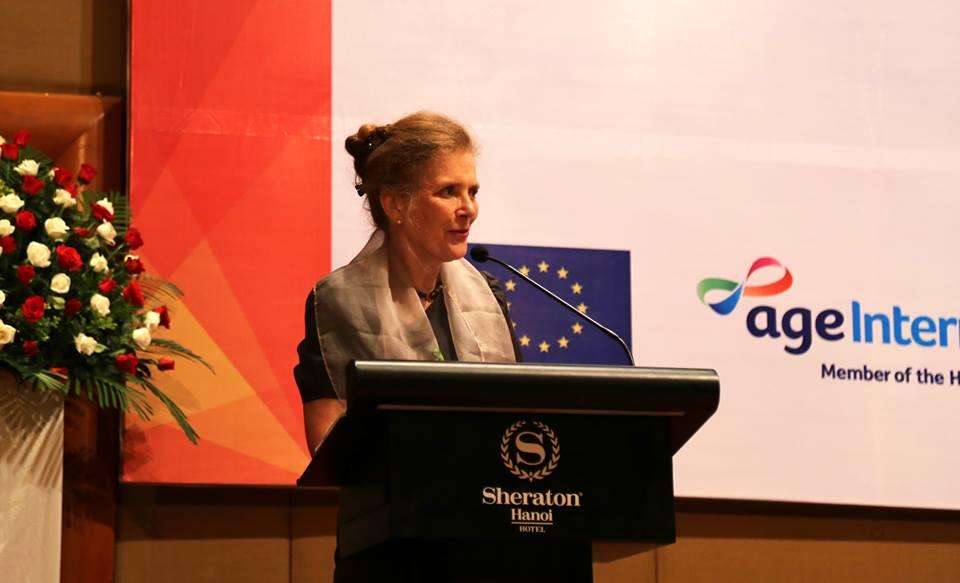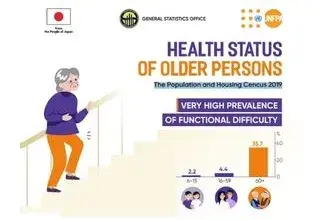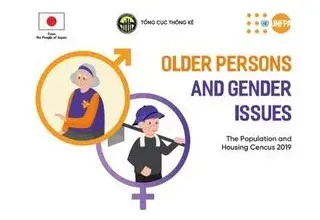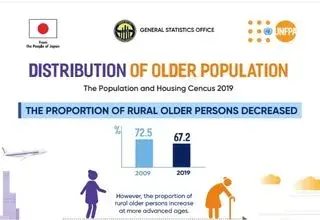Your Excellency Mr Nguyen Trong Dam, Vice Minister of Labour, Invalids and Social Affairs;
Mr. Eduardo Klien, Regional Director, HelpAge International;
Ms. Lubna Baqi, Deputy Regional Director of the UNFPA Asia-Pacific Regional Office;
Representatives from MOLISA, Government agencies, AFPPD delegates, research institutes, civil society organisations, donor agencies, international and local NGOs, the private sector and the media;
UN colleagues;
Ladies and gentlemen,
A very good afternoon to you all.
On behalf of UNFPA, our heartfelt thanks to the Government of Viet Nam and HelpAge International for hosting this truly important and exciting event. UNFPA is proud to have been a co-organizer.
I’d also like to thank all the international and national participants who have contributed to discussions that have been wide-ranging and meaningful, rich in data and evidence, as well as the lessons of life itself.
It’s been just two days, but what a full and stimulating conference this has been.
Economic scenarios have been unpacked; diversity between countries has been studied; older people’s political and economic voices have been raised; and better ways to capture the necessary data have been identified. And these are only some of the discussions and debates that were entered into and thrashed out here in Hanoi. We have more clarity on the way forward.
But we must be careful. In some countries in the region, governments are taking measures to reverse fertility decline by putting in place incentives to expand family size. Measures that allow women to balance their dual responsibilities and encourage men to play a greater role on the home front are welcome. However, it is quite unlikely that these incentives will lead to a return to replacement level fertility in the foreseeable future. We instead need to recognize and accept the inevitability of population ageing – as one of our speakers said, “Population ageing is here to stay.”
We do not wish to downplay the challenges. But as we have heard very clearly at this conference, let us dispel the “doom and gloom” – and strategically work towards truly equitable and inclusive societies, with prosperity across the entire life cycle.
First, we must recognize that there are diverse contexts in diverse countries. Let’s understand each country’s particular situation, supported by solid research and robust data. This will help form sound and strategic policy to protect and empower the most vulnerable on one hand, while leading to fiscal sustainability on the other.
Second, older persons should be viewed as a genuine benefit to society, not a cost or a burden. This requires all of us to address discrimination and attitudes towards older persons that ultimately hurt society at large. As our expert panel noted yesterday, we need to “change the narrative” around ageing. In doing so, we must help develop the political, economic and social reforms needed to adapt societies to an ageing world. As many of our speakers have stressed, this requires a life cycle approach – constantly addressing and linking the needs of all population groups in policy-making, and not viewing older persons in isolation.
Third, older persons are an important economic resource for development. Countries should increase and enable employment opportunities, implement a flexible retirement age, and create skills development for older persons – supported by advances in technology - as a means to ensure income and benefits for old age.
Fourth, different generations can support each other as our societies change rapidly. These changes should not be seen as crises, but opportunities to rethink what kind of societies we want – where old and young alike can enjoy a life with opportunities and dignity. Both younger and older generations should be included in the development planning process. Their issues, needs and concerns should be mainstreamed in all national development policies.
Fifth, we need to be proactive and prepare now for the not too distant future -- by establishing proper health care and social protection systems, even as we provide skills development and employment opportunities for older persons. Adapting skillfully and flexibly to the fast-changing scenarios across our region is key to success.
And, on a personal note, l would like to add a sixth point which is that this conference has changed my perspective on my own ageing. At the end of this conference, l am able to face my own ageing in a more realistic, positive way. You have changed my narrative, and l thank you for that.
Distinguished guests, many countries were successful in meeting many of the Millennium Development Goals ahead of the 2015 deadline. Increased life spans are a triumph of development for our region. Now, remaining challenges – including those related to older persons -- must be addressed under the 2030 Sustainable Development Agenda and its Goals whose central pledge is “to leave no one behind”. UNFPA is committed to continuing our work, in close partnership with the Government of Viet Nam and all Member States, as well as our development and civil society partners, to promote the role of older persons in society and to seek ways to prepare countries for ageing populations.
Let’s collectively transform challenges into opportunities, and bring about practical and positive solutions to shape the shared future of our region – and our world – with the optimism which has been heard so loudly and clearly throughout this conference. Thank you.





